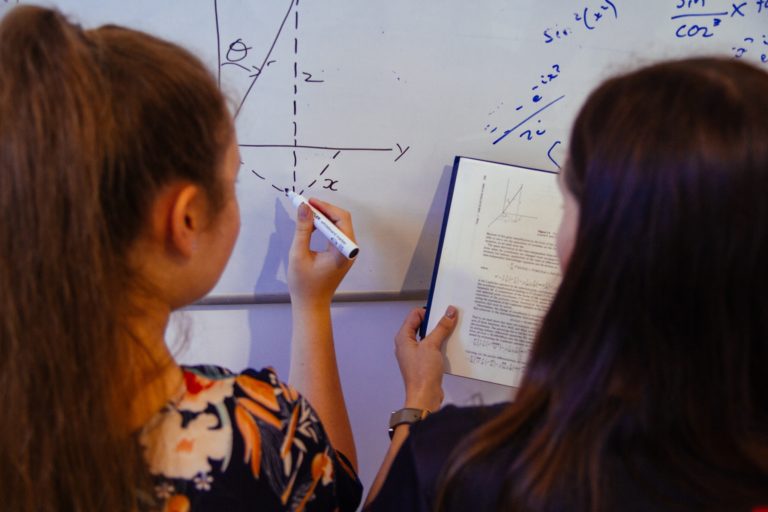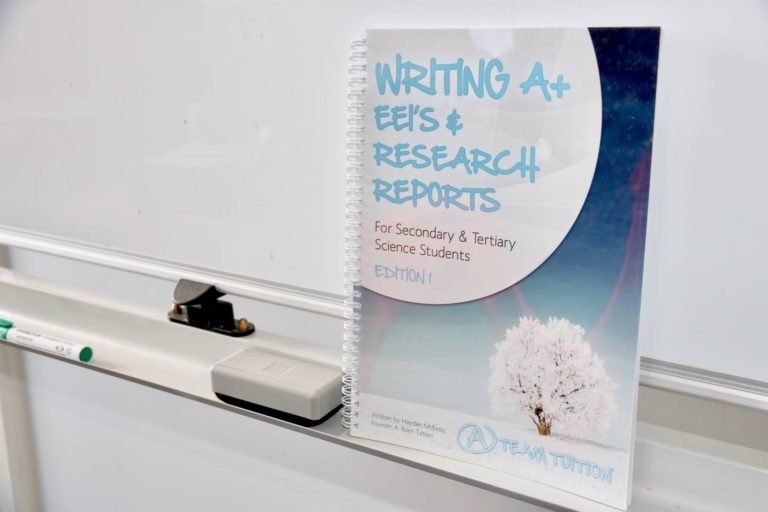How to Get an A in Physics: A 7 Step Guide to Success
A lot of people say that it’s impossible to get an A in high school physics. This couldn’t be more wrong. Physics is a hard subject, not even the most optimistic tutor (me) would ever deny that. But if you work hard and follow these steps, you’ve got great odds of landing that fabled A.
1. Make good notes
This step is a pretty good start for any subject, but it’s particularly important for physics. Physics classes can be pretty intense, and it’s easy to end up blankly staring into space while the equations roll around you.
That’s obviously not the best situation, but it can be hard to avoid once the teacher really hits their kinematic-equation-stride. However, if you get the key points written down, you’ll be able to come back later and work through it at your own pace. In particular, if your teacher writes an equation on the board, get that written down, it is DEFINITELY important. Make sure you write down what they stand for too, so you don’t end up with a “Where did that C come from? What does that even mean?” kind of situation. Ideally, you’re getting everything important your teacher says written down, but if you get these key points, you’ll be able to come back and figure it out later.
2. Understand your formulae

The next step is figuring out how your formulae work. Get used to breaking apart your equations, figuring out how the different pieces work together, and working out what units your answer is going to have.
Familiarise yourself with different ways the formula is commonly rearranged, and other formulae that tend to link in with it. For example, if you’re working with the equation for friction (frictional force is equal to the coefficient of friction times the normal force), then practice rearranging that equation a few different ways, so you’re used to it in all its common forms.
This is an equation for a force, so other equations that use force (like F=ma, for example) might be useful things to be able to substitute in. If you can do this step, then the next one will become much easier.
3. Practice using your formulae. A lot.
It’s pretty much exactly the way it sounds, but it’s really worth emphasising. If you don’t practice using the equations you’ve been given, over and over again till you cringe at the very mention of the word “friction,” you won’t get an A for physics. It’s as simple as that.
Do the problem questions your teacher hands out as homework. Find more in your textbook and do them too. Check your answers and make sure you’re doing them right. If you can do that, then congratulations, you’re already most of the way to getting that A. There are still a few more tips and tricks that’ll help you along the way though.
4. Look for “reasonable” numbers
Physics is an easy subject to make lots of little errors in, and those silly mistakes really start to add up when they’re costing you a mark or so at a time. Because you probably won’t have time in an exam to check your work as rigorously as normal, the best way to avoid them is to know what sort of answers you expect for these sorts of questions.
If you’re doing a friction question, and your calculator tells you that the object will be experiencing 758, 437N of frictional force, you should probably take a step back and go “huh, that’s really, really high.” Generally, your answers for certain types of questions are all going to fall within a certain range, and anything outside that is a clue that something’s gone wrong.
If you’ve done a hundred friction questions, and gotten answers between about 2N and 15N every time, then when you see that crazily big (or small) answer come up in the exam, you know something has gone wrong. As a result, you can go back and check, and figure out that you’ve divided the normal force by the coefficient of friction instead of multiplying it, or whatever silly little error you’ve made. Sometimes, there won’t be an error, but it’s definitely a clue that you should go back and check.
Is your child struggling? Find out more about our high school tutoring
5. Start EEI’s early

EEI stands for Extended Experimental Investigation or Early… Okay, I can’t think of a second “E” word there, but you get the point. You really can’t start an EEI the night before.
To be honest, starting even a week before is crazy brave. Between the testing and the research, these things are months of work, and you should plan accordingly. If you start the second your teacher hands them out, you’ll be fine. If you leave them till the last minute, they will become the hell that everyone says they are.
6. Do your research before you test
This one kind of goes hand in hand with the last one, but it makes a big enough difference to get its own heading. At the end of the day, there’s a certain amount of research into the topic you’re doing your EEI on that you’ll have to have done before you can write the final report.
The choice is up to you about whether you do that before you gather your data, or after. However, it’s really worth getting in early and getting this done before you test, because it will make your job a heap easier. Not only will it mean you actually know what you’re looking for when you’re gathering data, you’ll often find helpful tips online when you’re researching that will help you refine your experiment.
Plus, it means less for you to do at the end, when you’re busy tearing your hair out writing the report on your findings, so it’s a win-win.
7. Make a formula sheet, then ignore it
The last step should be done either throughout the term or when you’re revising for your exam. Either way, it’s really important. Gather up all the formulae you’ve used throughout the term, write down what all the variables mean, and put this all onto one A4 page (they should probably fit, go double-sided if you have to).
You can use this for the start of your revision. Then, once you’re starting to get a handle on the topics you’re covering, try and use it less and less. Even if you know you’ll get a formula sheet in the exam, it’s worthwhile weaning yourself off it if you can. Otherwise, in the exam, you’ll waste heaps of time flicking back to look at the piece of paper with all the tiny little equations on it.
If you can get to the stage where you’re not relying on it, then you know that you’ve got those equations in your head, and you’re ready to rock this exam.
7.5. Don’t freak out!
Physics is hard, but people pass it all the time, and yes, people even get A’s. Follow these steps, and you will be one of them. Good luck!
Looking to improve in another subject? See all of our articles for high school students!
